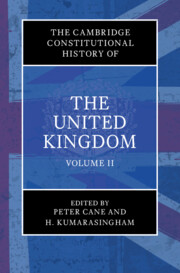Book contents
- The Cambridge Constitutional History of the United Kingdom
- The Cambridge Constitutional History of the United Kingdom
- Copyright page
- Contents
- Contributors
- Editors’ Preface
- 1 The Kingdoms of Anglo-Saxon England (450–1066)
- 2 England after the Conquest
- 3 England in the Thirteenth Century
- 4 England in the Fourteenth Century
- 5 England in the Fifteenth Century
- 6 England in the Sixteenth Century
- 7 The English Constitution in the Seventeenth Century
- 8 A European Perspective
- 9 Wales before Annexation
- 10 The Scottish Constitution before 1707
- 11 The Eighteenth-Century Constitution
- 12 The Constitutional and Parliamentary History of Ireland till the Union
- 13 The United Kingdom in the Nineteenth Century
- 14 The United Kingdom in the Twentieth Century
- 15 The Twenty-First-Century Constitution
- 16 Wales since the Annexation
- 17 Scotland in the Union
- 18 Ireland in the Union
- 19 The Making of Empire
- 20 Constitution and Empire
- Index
20 - Constitution and Empire
Published online by Cambridge University Press: 12 August 2023
- The Cambridge Constitutional History of the United Kingdom
- The Cambridge Constitutional History of the United Kingdom
- Copyright page
- Contents
- Contributors
- Editors’ Preface
- 1 The Kingdoms of Anglo-Saxon England (450–1066)
- 2 England after the Conquest
- 3 England in the Thirteenth Century
- 4 England in the Fourteenth Century
- 5 England in the Fifteenth Century
- 6 England in the Sixteenth Century
- 7 The English Constitution in the Seventeenth Century
- 8 A European Perspective
- 9 Wales before Annexation
- 10 The Scottish Constitution before 1707
- 11 The Eighteenth-Century Constitution
- 12 The Constitutional and Parliamentary History of Ireland till the Union
- 13 The United Kingdom in the Nineteenth Century
- 14 The United Kingdom in the Twentieth Century
- 15 The Twenty-First-Century Constitution
- 16 Wales since the Annexation
- 17 Scotland in the Union
- 18 Ireland in the Union
- 19 The Making of Empire
- 20 Constitution and Empire
- Index
Summary
The British constitution’s global historical resonance is in no small part due to the extent and might of the British Empire, which touched the lives of more of humanity than any other in history. The imperial factor compelled the wide international importance of the British constitution and its history, which would otherwise be disproportionate to the clouded hills of an archipelago in the north Atlantic. In fact, Britain’s constitution, history, law and politics were analysed by all manner of people abroad in far greater numbers than those at ‘home’. Different lessons were learned. Gandhi, for example, who was admitted to London’s Inner Temple in 1888, in his early political career, looked back at Queen Victoria’s 1858 proclamation as ‘the Magna Charta of the Indians’1 and, till the end of his life, retained a certain ‘romantic veneration’ towards the British constitution and what it might do for India.2 On the other hand, his close follower Subhas Chandra Bose, who had also spent time in Britain as a student, in his 1938 presidential address to the Indian National Congress, warned, as in Ireland and Palestine, that ‘British ingenuity’ would ‘ruthlessly’ find a ‘constitutional device’, which he foretold would lead to the partitioning of India, ‘thereby neutralising the transference of power to the Indian people’.3 These two divergent reactions give some sense of the diversity of ideas the British constitution and history generated even among two familiar colleagues in the same country, both wanting freedom.
Keywords
- Type
- Chapter
- Information
- The Cambridge Constitutional History of the United Kingdom , pp. 496 - 528Publisher: Cambridge University PressPrint publication year: 2023

